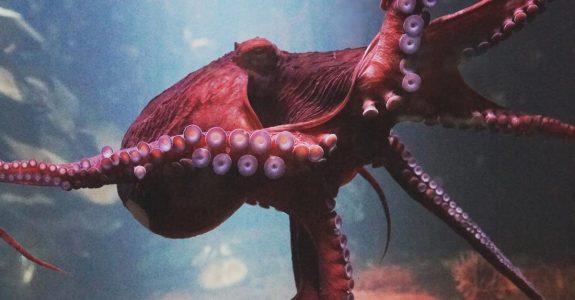Companies around the world are racing to develop commercial octopus factory farms and are finally getting close to artificially creating the conditions needed for industrial-scale breeding of octopuses. Researchers in Australia, Japan, Mexico, Spain and the United States are all developing ways to keep octopus alive in large-scale commercial farms. One company, based in Spain’s Canary Islands, reportedly plans to open a facility in 2023 where at least 60,000 captive octopuses will be kept and slaughtered every year.
All animals suffer on factory farms, but octopuses are especially unsuitable for intensive farming. Octopuses are known for their extraordinary intelligence, natural inquisitiveness and tendency to explore, manipulate and control their environment. They are also solitary animals that would not fare well in crowded aquaculture pens. Scientific experts have concluded that octopuses are sentient beings and that it is impossible to farm them in a way that doesn’t cause them serious harm.
Octopus are also fragile. They have never been farmed before, and their complex needs are still a mystery. They do not have internal or external skeletons to protect them, and their skin is easily damaged, especially when confined in an unnatural, crowded environment.
It is environmentally unsustainable to meet the needs of octopuses’ carnivorous diets at such large scales. As octopuses are carnivorous, industry and researchers are currently developing feeds for farmed octopuses based on the use of fishmeal and fish oil from wild-caught fish. This would place additional unsustainable pressure on wild fish populations and contribute to food security issues in regions such as West Africa, Southeast Asia and South America where the industrial fishmeal factories are located.
CIWF reports that there is no current legislation to protect the welfare of farmed octopuses, with no laws in place in the EU, the US, Mexico, or Japan, where octopus farming is being developed, to regulate their welfare and farming practices. It would be totally irresponsible for lawmakers to allow the continued development of plans to farm octopuses without proper legislation in place.
Animal Justice is a member of the Aquatic Animal Alliance coalition working to oppose octopus aquaculture development internationally and prevent the development of these factory farming methods before octopus farms become widespread. Please join us and voice your objection to octopus factory farms!




